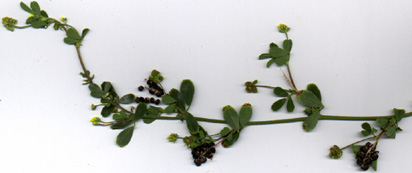
|
| Black Medick; Medicago lupulina L. |
Pea Family; LEGUMINOSÆ (FABACEÆ)
|
| Some weeds are absolute villains (to our way of thinking), while others compel us to temper our cursing with some grudging
admissions, if not praise. A few plants, such as fennel, are so constituted that we bless them as saviors, damn them as pests, and
variously eat 'em or beat 'em. |
| Last month a miserable little runt known as Hop Clover
(Trifolium dubium) was our highlighted weed. Now we introduce
a close cousin, who is not so bad, so common, so small and weak. Black Medick
(Medicago lupulina) bears the same relation in size
to Hop Clover that rats do to mice: the heavyweight version. |
| Both weeds, as usual, are of Old World origin. Both are low-growing, are often flattish, with tiny yellow flowers.
Unlike Hop Clover, Black Medick is not, however, a wimpy little summer annual. It can overwinter. It can make tough stems as long as
five feet. Its leaves are larger, hairier, and far more strongly flavored. Its seeds are black, not pale red-brown. |
| Other names for Black Medick are: Black Hay, Black Nonesuch, Blackweed, Hop Medick, or Yellow Trefoil. Indeed, it
also gets called Hop Clover. Mostly the name "Clover" is used for species of
Trifolium, while "Medick" applies to species of
Medicago. Purple Medick is Medicago
sativa, better known as Alfalfa or Lucerne. It also grows wild hereabouts, but is not a common weed
as are Black Medick and Hop Clover. |
| The origin of the scientific names bears noting. The ancient Greeks called Alfalfa
Medice, because it came to them from Media (today's Iran). Hence the Latin name
Medica for Alfalfa. The botanist Linnæus rendered it
Medicago lupulina, because the densely congested flower-clusters recall those of the Hops plant
(Humulus Lupulus). In other words, the name Hop Clover
can logically apply to Black Medick. |
| I purposely keep some Black Medick in my garden, because it is not especially hard to control, and is edible, presumably
of extraordinary nutrition (like Alfalfa). The flavor, sampled straight and unalloyed, is enough to make a first-time taster grimace,
but becomes tolerable after experience has prepared the eater to brace his or her tastebuds for an assault. Besides tasting worse than
alfalfa pellets, Black Medick is chewy. Nonetheless, in making a salad of 50 or more different kinds of plants, I cannot be overly
discriminating; I eat the young growing tips and flowers. |
| Hop Clover, on the other hand, I have battled for years, and eventually will be rid of it. Being so small and seedy, it has
so far managed to sneak around under my feet, and has maintained a presence. It is able to hide; Black Medick is too big to escape notice. |
| Black Medick can be an annual, a biennial, or even a short-lived perennial. Its small yellow flowers bloom from late
April into November. It is drought-tolerant, prefers sunny sites, and is often munched on by some animal life besides me. If you don't
want to eat it, you ought to get rid of it, otherwise it will reseed dramatically, and sprawl all over your land. Being a legume, it
fixes nitrogen symbiotically, and has been used by some people as a cover crop and sown for forage. |
But for most such purposes, one would do better to employ its cousin Alfalfa. In Seattle, most Alfalfa flowers bear
purplish flowers; a few are whitish-blue or pale yellowish. It doesn't resemble Black Medick, being fully perennial, upright, larger-leaved
and larger flowered.
|
Originally published as the Seattle Tilth newsletter Weed of the Month in April 1995, along with an illustration from a book.
Back |
|
|

